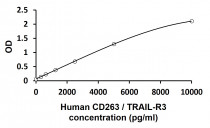ARG81333
Human CD263 / TRAIL-R3 ELISA Kit
Human CD263 / TRAIL-R3 ELISA Kit for ELISA and Human
Overview
| Product Description | ARG81333 Human CD263 / TRAIL-R3 ELISA Kit is an Enzyme Immunoassay kit for the quantification of Human CD263 / TRAIL-R3 in serum, plasma and cell culture supernatant. |
|---|---|
| Tested Reactivity | Hu |
| Tested Application | ELISA |
| Specificity | Specific for Human CD263 / TRAIL-R3. No cross reactivity was observed with TRAIL, CD117, IL-6R, IL-2R, CD116, TRAIL R1, TRAIL R2, TRAIL R4, CD178, and Granzyme B. |
| Target Name | CD263 / TRAIL R3 |
| Conjugation | HRP |
| Conjugation Note | Substrate: TMB and read at 450 nm. |
| Sensitivity | 147 pg/ml |
| Sample Type | Serum, plasma and cell culture supernatants. |
| Standard Range | 312.5 - 10000 pg/ml |
| Sample Volume | 100 µl |
| Alternate Names | Lymphocyte inhibitor of TRAIL; Antagonist decoy receptor for TRAIL/Apo-2L; TNF-related apoptosis-inducing ligand receptor 3; DCR1; TRID; CD antigen CD263; Tumor necrosis factor receptor superfamily member 10C; CD263; Decoy TRAIL receptor without death domain; LIT; Decoy receptor 1; DcR1; DCR1-TNFR; TRAIL-R3; TRAIL receptor 3; TRAILR3; TRAIL receptor without an intracellular domain |
Application Instructions
| Assay Time | ~ 4 hours |
|---|
Properties
| Form | 96 well |
|---|---|
| Storage Instruction | Store the kit at 2-8°C. Keep microplate wells sealed in a dry bag with desiccants. Do not expose test reagents to heat, sun or strong light during storage and usage. Please refer to the product user manual for detail temperatures of the components. |
| Note | For laboratory research only, not for drug, diagnostic or other use. |
Bioinformation
| Database Links |
Swiss-port # O14798 Human Tumor necrosis factor receptor superfamily member 10C |
|---|---|
| Gene Symbol | TNFRSF10C |
| Gene Full Name | tumor necrosis factor receptor superfamily, member 10c, decoy without an intracellular domain |
| Background | The protein encoded by this gene is a member of the TNF-receptor superfamily. This receptor contains an extracellular TRAIL-binding domain and a transmembrane domain, but no cytoplasmic death domain. This receptor is not capable of inducing apoptosis, and is thought to function as an antagonistic receptor that protects cells from TRAIL-induced apoptosis. This gene was found to be a p53-regulated DNA damage-inducible gene. The expression of this gene was detected in many normal tissues but not in most cancer cell lines, which may explain the specific sensitivity of cancer cells to the apoptosis-inducing activity of TRAIL. [provided by RefSeq, Jul 2008] |
| Function | Receptor for the cytotoxic ligand TRAIL. Lacks a cytoplasmic death domain and hence is not capable of inducing apoptosis. May protect cells against TRAIL mediated apoptosis by competing with TRAIL-R1 and R2 for binding to the ligand. [UniProt] |
| Highlight | Related products: CD263 antibodies; CD263 ELISA Kits; New ELISA data calculation tool: Simplify the ELISA analysis by GainData |
| PTM | N-glycosylated and O-glycosylated. [UniProt] |
Images (1) Click the Picture to Zoom In
| Title | Download Link |
|---|---|
| ARG81333 Human CD263 / TRAIL-R3 ELISA Kit User's manual |
 Download Download
|






